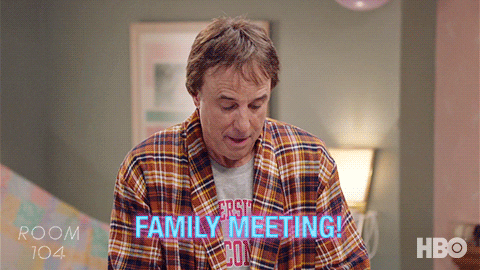- The Caregiver Times
- Posts
- Caregiver's Corner: Effective Communication and Conflict Resolution
Caregiver's Corner: Effective Communication and Conflict Resolution
The Art of Navigating Caregiving Conversations with Family
Ever feel like you’re starring in your own family drama or sitcom? Caregiving can turn life into a whirlwind of emotions, misunderstandings, and those “did that really just happen?” moments. The good news? Open and effective communication can turn chaos into harmony and keep everyone laughing (or at least talking). Caregiving can strain even the closest of families. Open and effective communication is key to ensuring everyone is on the same page and working together harmoniously. Here’s how to improve your conversations and keep the peace.
Table of Contents
Strategies for Smooth Communication
Be Clear and Concise: Express your needs and concerns clearly without overwhelming others with too much information.
Active Listening: Give your full attention, listen without interrupting, and acknowledge others' feelings and viewpoints.
Regular Updates: Keep everyone informed about the caregiving situation, progress, and any changes in plans.
Holding regular family meetings can also help. Set an agenda to stay focused, establish ground rules to ensure respectful and constructive discussions, and follow up with summaries to avoid misunderstandings.
Handling Disagreements
Caregiving can bring out the best—and the not-so-best—in all of us. With a few savvy strategies, you can turn those dramatic moments into constructive conversations.
Stay Calm: Keep emotions in check and approach conflicts with a cool head.
Seek Compromise: Find a middle ground that respects everyone's opinions and needs.
Bring in a Mediator: If necessary, involve a neutral third party to help resolve disputes objectively.
Consistency, empathy, and support are crucial for maintaining family harmony. Regular routines and clear expectations help reduce confusion and stress. Understand and respect the feelings and perspectives of each family member, and offer encouragement and appreciation for everyone's contributions to caregiving.
Expert Advice: Keeping the Family Harmonious
Picture this: a blend of expert advice, a sprinkle of empathy, and a dash of consistency. Voila! You've got the recipe for family harmony.
Maria's Story: Finding Balance in Family Caregiving
Maria is in the middle of six siblings, all caring for their mom and aunt, who live with her. Her siblings live nearby and often stop by to help. They all get along great because no one is being told what to do, and everyone can come and go as they please.
The problem is that this lack of order and consistency means Maria ends up filling in all the gaps. She is always rearranging her plans to meet her mom and aunt's needs, and it's starting to wear her out. They need more structure, but Maria is afraid of making others responsible or feeling like she's being bossy.
“By holding regular family meetings, we managed to stay united and support each other better.” Maria P

Gif by poseonfx on Giphy
John's Story: Stepping Up for Granddad
John, a young man of 22, lives with his independent but aging grandfather. His family, who all live in other cities, wanted someone to be there for oversight and to help with odd jobs. Recently, John has noticed worrying signs of forgetfulness in his granddad: the stove left on, the car running, and the door left open.
The turning point came when John discovered his grandfather was mixing up medications and forgetting doses. Realizing the potential dangers, John reached out to his parents, aunts and uncles for help. It was tough for him to take on a leadership role within his family, especially at such a young age, but he knew it was necessary to ensure his granddad's safety and well-being.
“Active listening and clear communication helped us avoid many potential conflicts.” John M
By incorporating these strategies, you can improve communication, resolve conflicts effectively, and maintain a harmonious family environment while caregiving. For more tips and resources, visit Family Caregiver Alliance.
Books!
Consider these books to further your strategies and awareness of creating conflict-free communication with the family:
"Family First: Your Step-by-Step Plan for Creating a Phenomenal Family" by Dr. Phil McGraw
Dr. Phil provides a practical guide for creating a strong, supportive, and loving family environment, addressing common family conflicts and how to resolve them.
Amazon Link: Family First: Your Step-by-Step Plan for Creating a Phenomenal Family" by Dr. Phil McGraw

"The 7 Habits of Highly Effective Families" by Stephen R. Covey
Covey adapts his classic principles of effectiveness to the family setting, offering strategies for building strong and harmonious family relationships.
Amazon Link: The 7 Habits of Highly Effective Families

"Chicken Soup for the Soul: Living with Alzheimer’s & Other Dementias: 101 Stories of Caregiving, Coping, and Compassion"
While focused on caregiving, this collection includes stories that address the conflicts and challenges that arise in families dealing with dementia.
Amazon Link: Chicken Soup for the Soul: Living with Alzheimer’s & Other Dementias

If you received this email from a friend, please join our mailing list. It is quick and easy to subscribe here with your email. Welcome to The Caregiver Times.
